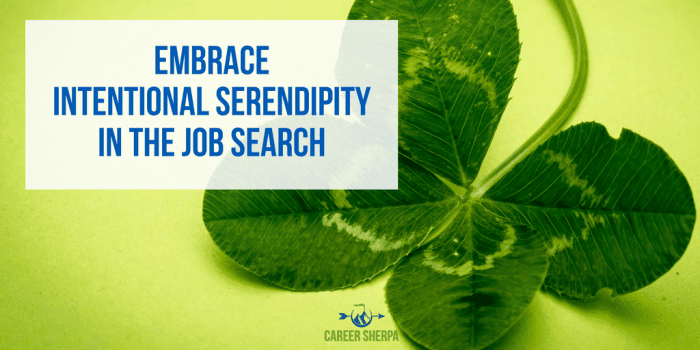Call it luck, chance, or serendipity… sometimes good things happen!
You can take steps to increase the odds that your next job or your dream career finds you. You just need to practice intentional serendipity!
 I met a person recently and we ended up talking about how people discover jobs by accident. His face lit up,
I met a person recently and we ended up talking about how people discover jobs by accident. His face lit up,
“that’s exactly what happened to me! In high school I was thinking about engineering or joining the military and then I discovered machine tool.”
Thirty years later he was the CEO of a large machine tool company and now is a consultant in that field.
While on my honeymoon, I met the Director of a high school technical center. I had no idea what a Vocational – Technical school was, but four months later, I was working for him and my life was transformed forever with an understanding and appreciation of all kinds of occupations.
We all have stories about chance events that changed the course of our careers. Then why is it that so many people want to take “one of those assessments that tells me what to do”. The longer I am in the career coaching business, the less assessments I use. My goal is to have my clients “embrace intentional serendipity.” In other words, take action to learn about jobs and be open to discovering opportunities by accident.
Here are 3 steps you can take to discover jobs or majors by creating luck or chance events in your life.
1. Embrace Chance Events
Think about your stories of chance events (like mine above) that have opened opportunities you had in your life…we all have them. You’ll have more.
Remember that this “non linear” way of living life has worked in the past and will again in your future. And it can work finding jobs.
Chance events are simply a part of life and should be embraced. Often time these chance events look like barriers or hassles but if you view them as opportunities they can often result in positive things happening.
2. Take Action
To move forward in finding a job you have to DO something. For many people it requires doing something DIFFERENT than they have been doing. The more ‘out of your comfort zone’, often the better.
The obvious ones are informational interviews, volunteering, part-time jobs, and taking a class or training. But it can be as simple as walking down a different road or driving to an appointment a different way to expose yourself to new businesses. The key is to be intentional in looking for new things which may lead to new opportunities.
3. Be Curious
Set up an informational interview to learn about a person’s occupation. Too many people say “I can’t just call someone up and ask to talk to them. I would not even know what to ask!” Start with people you know. You will be surprised at how most people really do want to talk about their jobs and share what they know. Oh yeah, when you leave, always ask them “Who else should I talk to?”
Embrace curiosity, it is how we learn. It can also be a great way to meet new people who actually might give you an idea of where to look for work, or maybe will inspire you to do a training.
Here are some things to think about:
- What is it that you do NOT know about the occupation you are exploring?
- What is it that you really want to know?
- How can you learn more about it?
- Who can you ask?
You will need to talk to people in the field, or close to the field, or follow discussions in LinkedIn that are focused on this, or….. do SOMETHING else. But you have to get as close as you can to the field.
Note: Searching on websites does not get you close enough, you need to reach out and make this real.
Final Thoughts
Intentional serendipity is a filter I wear whenever I meet with students or clients. I encourage them to expand their view of the world of work, don’t get caught looking too narrowly, and be open to chance events because they are a part of your life.
Thanks to Peak Carers for this Guest Post!
Jim Peacock is the Principal at Peak-Careers Consulting and writes a monthly newsletter for career practitioners. Peak-Careers offers discussion-based online seminars for career practitioners focused on meeting continuing education needs for GCDF and BCC certified professionals as well as workshops for career practitioners and individual career coaching.
Sign up for our monthly newsletter at Peak-Careers.com


